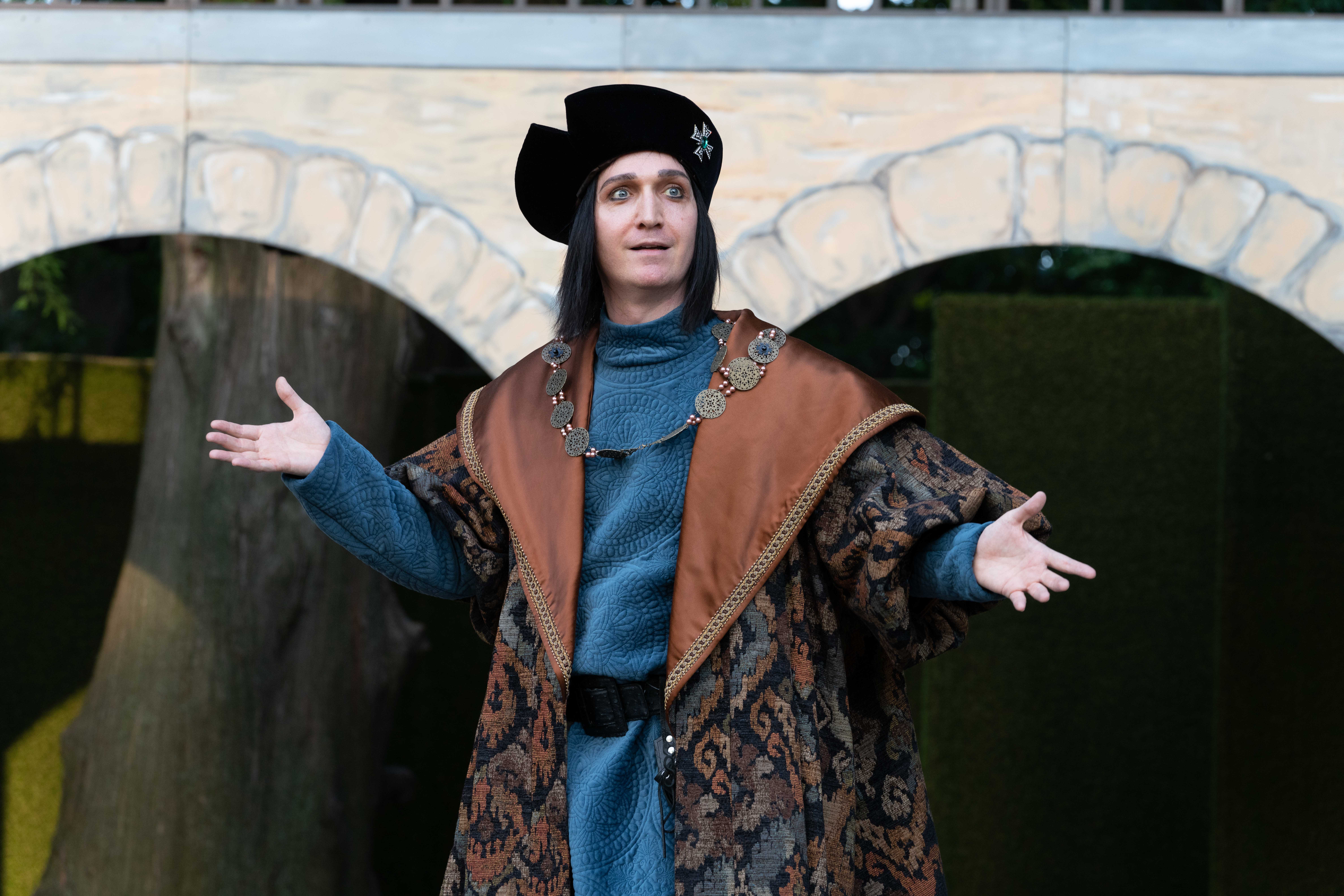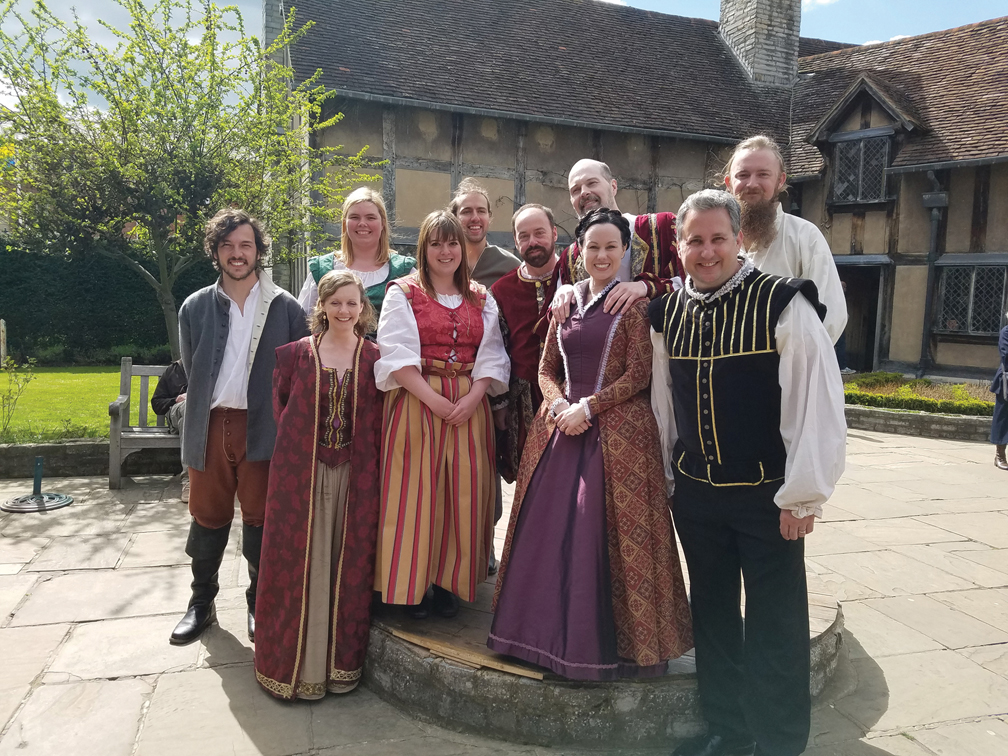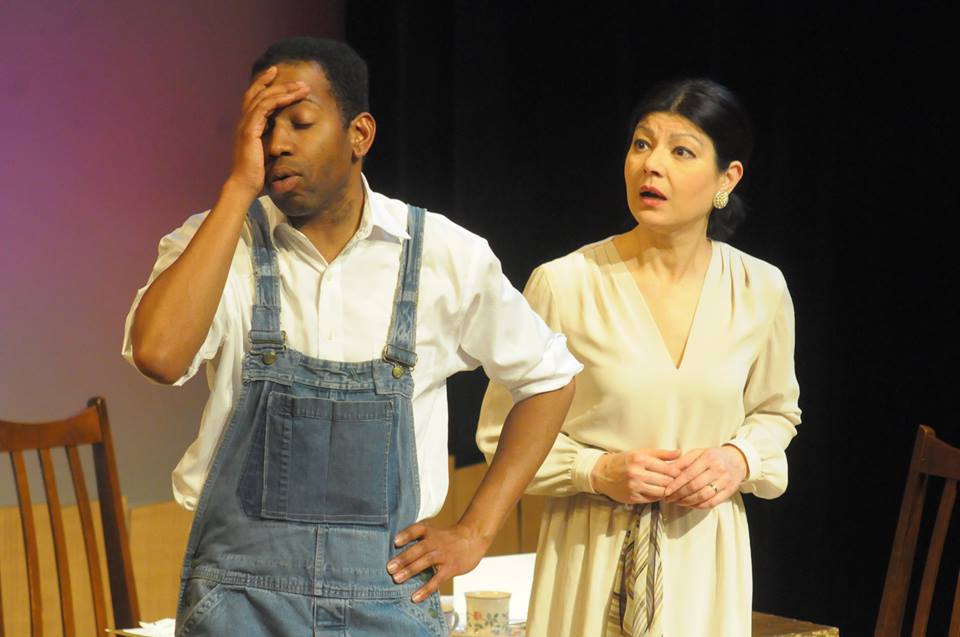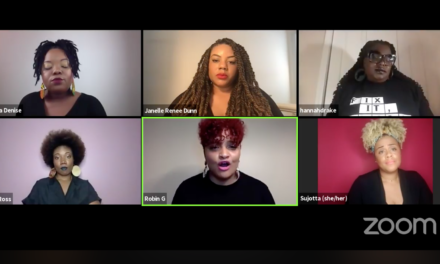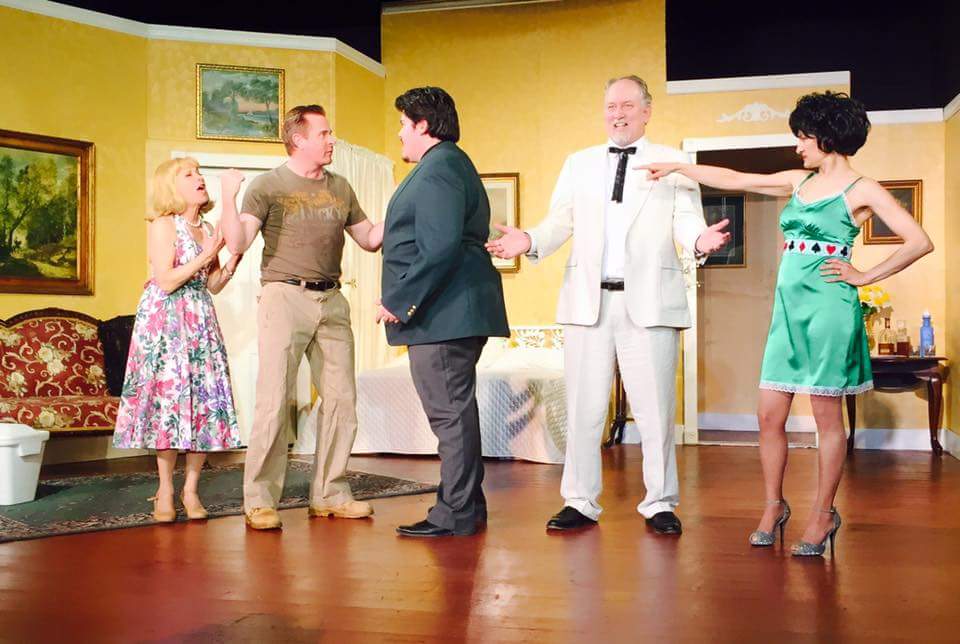Neill Robertson as Richard III. Photo: Bill Brymer.
Richard III
By William Shakespeare
Edited by Gregory Maupin
Directed by Amy Attaway
A review by Keith Waits
Entire contents are copyright © 2022 by Keith Waits. All rights reserved.
“Now is the winter of our discontent…” It may be the greatest opening in Shakespeare and for the next 20 minutes Richard, Duke of York (a commanding Neill Robertson), openly confesses his villainy in plain language before demonstrating it through the action of cravenly wooing Lady Anne (a raw and emotional Ashley Nicole Cabrera) beside the dead body of her husband, who was killed by Richard.
So this might be the least complex of Shakespeare’s villains, his motivation a malicious greed for power for power’s sake cloaked in the honor of royal lineage but lacking any desire to create a better society. Macbeth’s similarly bloody rise is tied to supernatural forces, and revenge or justice is a common element in other plays, but Richard feels like pure evil The character walks onstage with the weight of that understanding in the audience’s mind, the first challenge for the actor playing the role.
Neill Robertson downplays many of the cliches, and Donna Lawrence-Downs approximates the most famous portrait of Richard, so Robertson uses the oversize coat to suggest the misshapen physique sans elaborate devices, moving as if he can never relax and be comfortable in his own skin. While he is scheming, it fits his Machiavellian aspect, but once he is crowned, Richard doesn’t seem to know how to cope with his success, and is unprepared to govern or defend his position. He is truly lost, and the end feels like a richly deserved comeuppance rather than a tragedy.
The actor also finds great humor in Richard, alternating cold-blooded calculation with impish enthusiasm as his plotting unfolds. The play demands a powerful and charismatic performance at its center, and Robertson delivers a richly crafted obsequiousness. When at one point he outrageously claims he is afflicted by witchcraft of the Queen, it is a bold comic moment, a broad choice that in the hands of a lesser actor could have unraveled the threat of Richard.
Gregory Maupin adroitly charts the morally conflicted Duke of Buckingham, and Tyler Tate’s Duke of Clarence, Keith McGill’s Lord Hastings, Jon Huffman’s King Edward, and Braden McCampbell’s Earl of Hastings are all rendered with great feeling, but it is within the women that this production discovers the strongest emotional journeys as mothers, sisters, and wives of Richard’s victims. Abigail Bailey Maupin provides yet another master class in acting by navigating two long scenes as Queen Margaret, the hysterically grief-stricken matriarch left stranded and alone by Richard’s actions in the wars that precede this play. I would hazard to guess that both of these scenes are often cut significantly as they are filled with arguably redundant exposition and overwrought histrionics and require skill and discipline to avoid a headlong rush into confusion.
In the later scene she is joined by the equally expert Jennifer Pennington and fiery young talent Mollie Murk (so good in this season’s Twelfth Night) and together they form a triumvirate of grief and courage as they stand up to Richard at great risk. That they are positioned to demonstrate their strength and conviction seems to confirm that a woman was at the helm of this production. Faced down by the righteous force of these women, Richard becomes truly rattled and his defeat seems inevitable. His death on the battlefield at the hands of men struck me as, if not exactly anticlimactic, only the final note in his destruction.
Scenic, lighting, and sound design by Karl Anderson, Casey Clark, and Laura Ellis, respectively, are solid, but the inestimable Donna Lawrence-Downs’ costumes carry the greatest burden here. Besides Richard’s iconic garb, Jennifer Pennington wore the most exquisite of all of the exquisite dresses employed here, a deep, rich swath of matriarchal majesty that is the kind of costume actors like to claim does a lot of the work for them (don’t believe it).
After 400 years, the familiarity of William Shakespeare’s plots tend to undercut any sense of surprise or discovery, which may explain why there are so many productions that relocate period and location in an attempt to spin Shakespeare as “relevant” for contemporary audiences. Sometimes it works – Matt Wallace’s aforementioned Twelfth Night was set in 1920s New Orleans – and it can be thrilling, but it can also backfire. The relevancy of these plays are in the text, and the best productions explore the words with fresh insight. Amy Attaway’s dedication to tracking the War of the Roses histories in sequence and in an Elizabethan setting has been a real gift in illuminating their context and value, reminding us again why we keep returning to Shakespeare’s plays over and over again.
Featuring Leilani Bracey, Ashley Nicole Cabrera, Jon Huffman, Justin M. Jackson, Tom Luce, Arianna Martin, Abigail Bailey Maupin, Gregory Maupin, Braden McCampbell. Keith McGill, Molly Murk, Brittany “BeeBee” Patillo, Jennifer Pennington, Austin Ramirez, Tony Reimonenq III, Neill Robertson, Liliana Lican Shadle, Tyler Tate, Shaq Towns, Nick Wills, & Kyah Young
Richard III
June 16 – 19, June 22 – 26, July 12, 15, 20 & 23, 2022
Shakespeare Festival in Central Park
C. Douglas Ramey Amphitheater
1340 S. Fourth St.
Louisville, KY 40208
(502) 574-9900
kyshakespeare.com
Admission is free. Everyone is welcome, including pets.
Food trucks open at 6:30 p.m.; Will’s Tavern begins serving at 7:00 p.m.
Pre-Show begins at 7:15 p.m., with main stage production at 8:00 p.m.
Keith Waits is a native of Louisville who works at Louisville Visual Art during the days, including being the host of LVA’s Artebella On The Radio on WXOX 97.1 FM / ARTxFM.com, but spends most of his evenings indulging his taste for theatre, music and visual arts. His work has appeared in LEO Weekly, Pure Uncut Candy, TheatreLouisville, and Louisville Mojo. He is now Managing Editor for Arts-Louisville.com.

